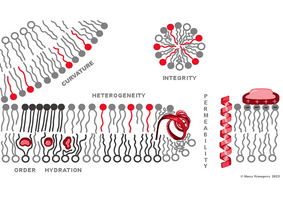Mit größter Bestürzung und Trauer haben wir, die Vorstandsmitglieder der Deutschen Gesellschaft für Biophysik, die Nachricht vom völlig unerwarteten und allzu frühen Tod unseres hochgeschätzen Mitglieds und ehemaligen geschäftsführenden Sekretärin der DGfB, Prof. Dr. Ulrike Alexiev, aufgenommen. Die DGfB, wie auch die gesamte Deutsche Biophysik, verliert mit Ulrike eine sehr erfolgreiche, engagierte und international sichtbare Wissenschaftlerin, die vielen jungen Wissenschaftlern und insbesondere Wissenschaftlerinnen ein Vorbild war.
Ulrike begann ihre wissenschaftliche Laufbahn nach ihrem Diplomstudium (1983-1988) an der Humboldt Universität Berlin und einer Tätigkeit am Max-Delbrück Zentrum in Berlin-Buch als Doktorandin am Fachbereich Physik der Freien Universität, wo sie 1994 bei Prof. Maarten P. Heyn in Biophysik mit Auszeichnung promovierte. Nach Forschungsaufenthalten in den USA habilitierte sich Ulrike 2002 am Fachbereich Physik der Freien Universität und gründete dort ihre eigene Arbeitsgruppe.
Mit großem Engagement und pädagogischem Geschick unterrichtete sie Biophysik und allgemeine Physik. Ihre hohe Kompetenz im Bereich der zeitaufgelösten Fluoreszenzspektroskopie und bildgebender Verfahren setzte sie sehr erfolgreich in der molekularen Biophysik zur Aufklärung von Funktionsmechanismen biologischer Photorezeptoren ein, wie dem Bakteriorhodopsin, Rhodopsin, Kanalrhodopsin und den Phytochromen. In der Biomedizin untersuchte sie die Zytochrom-c-Oxidase und in jüngerer Zeit den Stofftransport durch die Haut und die Eigenschaften von Hydrogelen. Ulrikes herausragende Forschungsleistungen sind in zahlreichen weltweit beachteten Publikationen dokumentiert und werden nicht vergessen werden.
Schon sehr früh engagierte sich Ulrike als Vorstandsmitglied der DGfB auch für die Deutsche Biophysik und den wissenschaftlichen Nachwuchs. In den Jahren 2007 bis 2014 hat sie sehr aktiv als Sekretärin die Geschäfte der DGfB geführt und dabei drei Vorsitzende (Peter Hofmann, Ulrich Nienhaus, Hans-Joachim Galla) intensiv unterstützt. Einige Innovationen, die mit ihrer Initiative die Entwicklungen unserer Gesellschaft nachhaltig gefördert haben, waren z.B. die Erstellung der deutschen Standortkarte „Biophysik“ mit Kurzbeschreibungen der Arbeitsgruppen. Auch das Verfassen und Versenden der DGfB-Rundschreiben in elektronischer Form begann in ihrer Zeit als geschäftsführende Sekretärin; insbesondere hat Ulrike die professionelle Erneuerung der Homepage unserer Gesellschaft vorangetrieben und damit die Sichtbarkeit unserer Gesellschaft deutlich erhöht.
National hat Ulrike Alexiev sehr erfolgreich und kreativ die Organisation der Sektionstagungen und der Jahrestagungen der DGfB vorangetrieben, und auch international hat sie sich bei der Ausrichtung der Europäischen EBSA-Tagungen eingebracht. Dabei war ihr insbesondere die Förderung des wissenschaftlichen Nachwuchses z.B. durch Reisestipendien zu den Tagungen der biophysikalischen Gesellschaften ein besonderes Anliegen. Durch ihr engagiertes Auftreten und Eintreten für Gleichstellung war sie stets Vorbild für KollegInnen und die nachfolgende Generation an WissenschaftlerInnen. In den acht Jahren ihrer Arbeit im Vorstand hat Ulrike das Profil der DGfB maßgeblich mitgeprägt. Durch ihre konstruktive Arbeit, ihre angenehme und freundliche Art und ihre Durchsetzungskraft hat sie im Vorstand der DGfB immer eine ausgleichende Rolle zwischen verschiedenen Interessensgruppen wahrgenommen.
Unser aufrichtiges Mitgefühl gilt den Mitgliedern ihrer Familie, Freunden, KollegInnen und allen, die Ulrike nahestanden. Die Deutsche Gesellschaft für Biophysik wird ihr Andenken in Ehren und ihr Engagement und ihre Persönlichkeit in dankbarer Erinnerung behalten.
im Namen des Vorstands der DGfB
Prof. Dr. Klaus Gerwert



